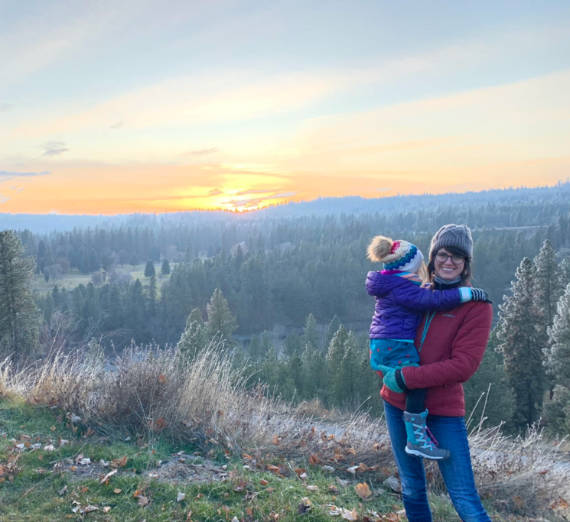Sustainability Q&A with Lauren Hackman-Brooks

What is your position and department at 91勛圖厙?
Associate Director, Mission and Ministry
What does sustainability mean to you?
I have a deep love for our earth and want to care for the land, plants, animals, air, water, and ecosystems that sustain me and all other life. Over the past few years, I’ve felt drawn to not only try to live more sustainability at a personal level but also to get more involved at a systemic level. For me, sustainability is deeply intertwined with my values of spirituality and simplicity, and these things together are a big part of why my family moved to this part of the country. My worldview and lifestyle have been deeply shaped by my faith, study, and experience - ultimately, I want to live and witness a way of life that is characterized by mutual, just, loving relationships with God, others, and the earth.
How have you been involved in promoting sustainability on campus?
I participated in the Employee Sustainability Ambassador Program last year, facilitated one of the Laudato Si reading groups in the spring, and attended several of the lunchtime forums.
What are some things you do in your personal life to live sustainably?
This has definitely been an ongoing journey which started for me as a Jesuit volunteer after college… with simplicity as one of our core values, I learned to cook things from scratch, use public transit and generally live well with less. Since then, my lifestyle has been greatly influenced by the witness of people around me (who packed their lunches in jars and used cloth napkins and real silverware at work) and the things I’ve read and listened to such as the work of Wendell Berry, Braiding Sweetgrass (Robin Wall Kimmerer), The Minimalists Podcast, Project 333, Going Zero Waste, Inconspicuous Consumption (Tatiana Schlossberg), and Animal Vegetable Miracle (Barbara Kingsolver). I have – solar panels, a LINC box subscription, a backyard vegetable garden, furniture & dishes that are primarily hand-me-downs (calling them “vintage” or “heirloom” makes them sound cooler), a smallish wardrobe sourced primarily from companies with environmental and labor practices that reflect my values. A few things I do are eat a “flexitarian” diet (mostly vegetarian, limited dairy), cloth diapered our daughter, buy tea/spices/staples from bulk bins, try to resisting the temptation to buy new “eco-friendly” things – first using up what I have and when that runs out or wears out, replacing with a more sustainable alternative. Some things I’ve recently learned to do are make kombucha, darn socks, rollover retirement savings into SRIs (socially responsibly investment accounts). Lastly, some things I am working on – Travel/transportation… With all of our family in the Midwest, air travel is and will continue to be a part of our life, so I want to learn more about carbon offsets. While I currently work remotely most days, I am generally car commuter and want to start riding my bike to GU. Next year, we plan to replace our front lawn with drought tolerant landscaping as part of the SpokaneScape program.
How could 91勛圖厙 continue to improve its sustainability efforts?
Coming from the Midwest, I am inspired by the ways in which our campus community has a strong sense of place and connection to the outdoors. I see a lot of good happening at the institutional level and at the individual level – I hope this is something we can continue to engage critically with one another and support one other in more fully becoming the kind of university and people we are called to be. These days, I’m particularly drawn to the call for divestment from fossil fuels and would like to support the student groups calling for that change.
How will you continue to promote sustainability at 91勛圖厙?
Last year was my first year at GU and in Spokane, and I’m excited to get more active in supporting the existing sustainability efforts on campus and locally. Having just completed the ESA program in the Spring, I’ve talked with some other ambassadors about starting a reading group where folks pick an accompanying sustainability challenge based on the text – I think that would be a neat way to keep learning, talking, and making change.
